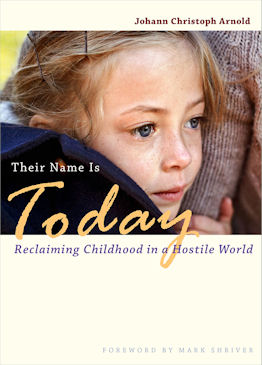
|
Posted September 26, 2014
Book: Their Name is Today: Reclaiming Childhood in a Hostile World Author: Johann Christoph Arnold Plough Publishing House. Walden, New York. 2014. Pp. 273 An Excerpt from the Jacket:
Despite a perfect storm of hostile forces that threaten to deny children a healthy, happy childhood, courageous parents and teachers can turn the tide. Yes, we can reclaim childhood, says Johann Christoph Arnold, whose books have helped more than a million readers through the challenges of education and family life. In Their Name is Today, he highlights drastic changes in the way our society treats children. But he also brings together the voices of dedicated parents and educators who are finding creative ways to give children the time and space they need to grow. Cutting through the noise of conflicting opinions, Arnold takes us to the heart of education and parenting by defending every child's right to the joy and wonder of childhood. An Excerpt from the Book: In The Brothers Karamazov, Dostoyevsky's character Father Zossima reminds us that this sensitivity of children is so great that we shape them without even knowing it, and he admonishes us to consider the effect of everything we say --- and especially everything we do --- in their presence. Every day and hour . . .see that your image is a seemly one. You pass by a little child, you pass by spiteful, with ugly words, with wrathful heart; you may not have noticed the child, but he has seen you, and your image, unseemly and ignoble, may remain in his defenseless heart. You don't know it, but you may have sown an evil seed in him, and it may grow . . .all because you did not foster in yourself an active, actively benevolent love. Unlike the children of Dostoyevsky's time, children today are exposed to a steady barrage of images and expressions whose combined effect may be far greater than that of the most caring adult in their immediate lives. Given the state of our culture, which undercuts parents at every turn, bringing up children is hard work. But despite all our efforts, most of us are far from the models we ought to be. Take violence. Everyone is concerned about it, and everyone agrees it is bad for children. But what is anyone really doing about it? From the halls of Congress on down, precious little. Politicians bicker about gun control, but is decisive action ever taken? Meanwhile the spate of school shootings continues, spawning ever more imitators. Several times I have had the privilege of counseling victims' families. Naturally, they needed time to talk and weep through their hurt and confusion, without having to cope with analysis and advice. But inevitably our conversation would come around to the root causes of school violence. Writing about this, novelist Barbara Kinsolver points out the contradiction in our attempts to address violence. Let's not trivialize a horrible tragedy by pretending we can't make sense of it. "Senseless" sounds like "without cause," and requires no action. After an appropriate interval of dismayed hand-wringing, we can go back to business as usual. What takes guts is to own up: this event made perfect sense. Children model the behavior of adults, on whatever scale is available to them. Ours are growing up in a nation whose most important, influential men --- from presidents to film heroes --- solve problems by killing people. It's utterly predictable that some boys who are desperate for admiration and influence will reach for guns and bombs. And it's not surprising that it happened in a middle-class neighborhood; institutional violence is right at home in the suburbs. Don't point to hard at the gansgsta rap in your brother's house until you've the Pentagon in your own. [These tragedies] grew straight out of a culture that is loudly and proudly rooting for the global shootout. That culture is us. Table of Contents: 1. The world needs children 2. Play is a child's work 3. Great expectations 4. Screening out 5. Material child 6. Actions, not words 7. Guidance to grow 8. In praise of difficult children 9. Discovering reverence 10. Tomorrow comes |
|
